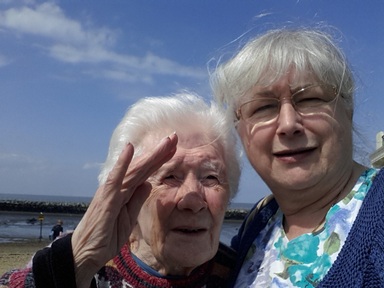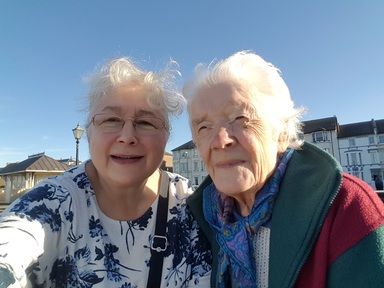Older people empowered by caring for fellow elderly
A revolutionary care concept where able, older people care for their fellow elderly is becoming increasingly popular in the UK.

Christian and Sally Wilse, founders of Seniors Helping Seniors (UK), claim to solve two of the biggest social problems in the UK - elderly care and employment opportunities for people as they age.
The couple brought the concept over from the US five years ago. Currently they are just based in Guildford, Harrow and Canterbury but they hope to eventually have 25 offices in the UK.
Their oldest caregiver is 83 but the average age is 65-75. They are usually semi-retired or have taken early retirement.
Mr Wilse says: “We don’t do personal care, so the job does not involve lifting, bathing, dressing, etc.”
Duties include preparing meals, companionship, pet care, shopping, helping with visits to the doctor, gardening, dementia care and overnight stays.
They now have around 45 people on the payroll and have never had any problems recruiting people.
“They are all on zero-hour contracts which they like as they can decide when they want to work and for how many hours. Some of them work every day for up to three hours a day, others a few hours a month, others strive for full time hours, and they enjoy the flexibility of being able to work intensely for periods of time,” he says.
Mr Wilse has found that as well as benefiting the person being cared for, the caregiver feels empowered.
Caring gives them a sense of purpose
“It keeps them active and gives them a purpose. Some live by themselves which can be lonely, so this means they can go out and meet people.”
Sixty-six year-old Eileen Connell has worked for Seniors Helping Seniors (UK) Ltd for just over four years.
She says: “In this job I am giving something. but I am also getting something back.”
She cares for 93-year-old Peggy, who has been living with dementia for several years. “On a good day we go out and on a not so good day we stay at home and chat, drink tea or sometimes she sleeps.
“She had a spell in residential care two years ago and we maintained our daily visits to keep the continuity going and so she would have a familiar person to relate to as she settled in. The residential care didn’t work out very well so her family decided to arrange for her to be cared for in her own home.”
Peggy has a live-in carer who has a two hour break every day. This two-hour break is covered by a visit from a caregiver from Senior Helping Seniors (SHS).
It is easier to relate to someone who is closer in age
“Peggy is of the same generation as my late parents. The things we talk about are the things I would talk to my parents about if they were still alive. We share memories of life in 50s and 60s that I know she can relate to.

“When I take Peggy out, we go to the same familiar places where I know it won’t be too busy. Peggy enjoys a latte and cake and loves to watch children and families with ice creams and playing. We don’t talk much when we are out. We exchange a lot of non-verbal smiles and gestures to share our thoughts on what is happening around us.
“I see another lady who is in her 80s. She has early stage dementia so we are able to do more of the things I used to do with Peggy. We go for walks, go to the garden centre or parks and to chair based yoga.”
Ms Connell finds that similarly to lots of people living with dementia, “she doesn’t always remember to eat, or thinks that she has already eaten, so my visit involves taking her out for a cooked breakfast or early lunch.
“Sometimes we prepare food to eat at home. After our yoga sessions we meet up with two other SHS providers and their clients and we all go for lunch together. The three of them eat like sparrows when they are on their own but if we are all eating together they can manage to eat a whole roast dinner and a pudding. The social side of eating makes a big difference. I can relate to that as I live alone and I too find it easier to prepare and eat meals with company.”
Ms Connell who is also an exam invigilator, was attracted to the role as she had retired but needed to earn some extra money “to enable me to enjoy more social and leisure activities than my pension will allow.
Flexibility
“I wanted to do something with a real purpose that is also paid and flexible. I like to be able to work as many or as few hours as I want. I wanted a job that would fit in with my life and I enjoy working with people.
“I used to be a resident house parent at a boarding school. I have also managed a care home. I never wanted to work in an office.”
She finds it “fun and satisfying to work with older people” and has found it “also gives me a connection with my parents’ generation who all lived through very difficult times. It is important that we don’t forget the social history that this generation can pass on to us all”.
Ms Connell believes that “it helps being older and caring for older people as we have life experience”.
'Win-win situation'
Having older people helping other older people is a win-win situation, according to the SHS founder.
“Both enjoy being together. They gain different things but they both gain health benefits. Caring, feeling purposeful and earning money is proven to improve health and well-being, which is why our CCG (clinical commissioning group) calls this ‘perfect primary care’ improving future and current health prospects,” he says.

Tony Cook is aged 70 and has been caring for a 90-year-old lady for two years.
He takes her to classical concerts and out for lunch. He says: “She likes getting ready and all dolled up. It seems to give her a real lift.
“It is good for me as well as it keeps me busy as I have been used to keeping very busy all my life.”
Founders Christian and Sally Wilse have found using older caregivers can really help if the person they are caring for has dementia.
“They may be resistant to someone coming into the home to care for them but if they are a similar age, they often think they are a friend and refer to them as a friend.”
This is borne out by a review by the son of a man with dementia who says: “Dad talks about his regular carer as a friend that visits”.
Mr Wilse is a huge advocate of the care concept Seniors Helping Seniors with its mutual benefits for both the caregiver and the person being cared for.
“Doing this job is so rewarding as you end up seeing a smile on both the caregiver’s face and the person being cared for,” he says.
click here for more details or to contact Seniors Helping Seniors (UK) Ltd - Canterbury
Latest Features News
 28-Nov-19
2019 Election: Labour pledges £10.8 bn for free personal care while Boris Johnson sidelines social care
28-Nov-19
2019 Election: Labour pledges £10.8 bn for free personal care while Boris Johnson sidelines social care
 18-Oct-19
Podcast: Wendy Mitchell and dementia: 'My biggest fear is not knowing who my daughters are'
18-Oct-19
Podcast: Wendy Mitchell and dementia: 'My biggest fear is not knowing who my daughters are'
 30-Sep-19
World's oldest diver aged 96 says 'never accept the fact you are getting old'
30-Sep-19
World's oldest diver aged 96 says 'never accept the fact you are getting old'
 27-Sep-19
Exclusive: Care minister backs care workers' call for time off to grieve and attend funerals
27-Sep-19
Exclusive: Care minister backs care workers' call for time off to grieve and attend funerals
 20-Sep-19
Podcast: Gyles Brandreth urges care workers to learn poetry with elderly
20-Sep-19
Podcast: Gyles Brandreth urges care workers to learn poetry with elderly